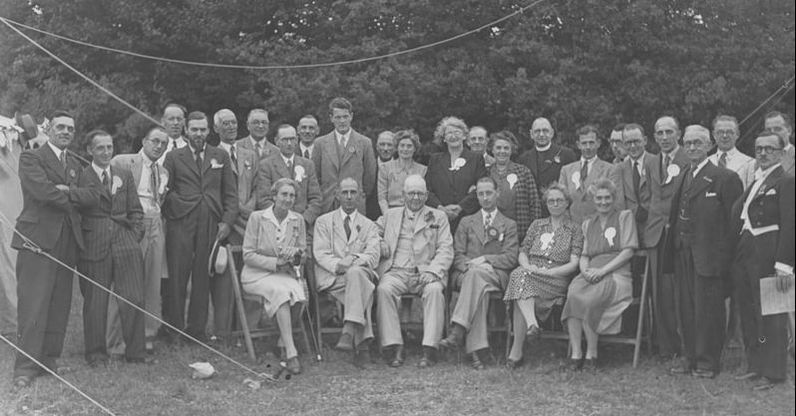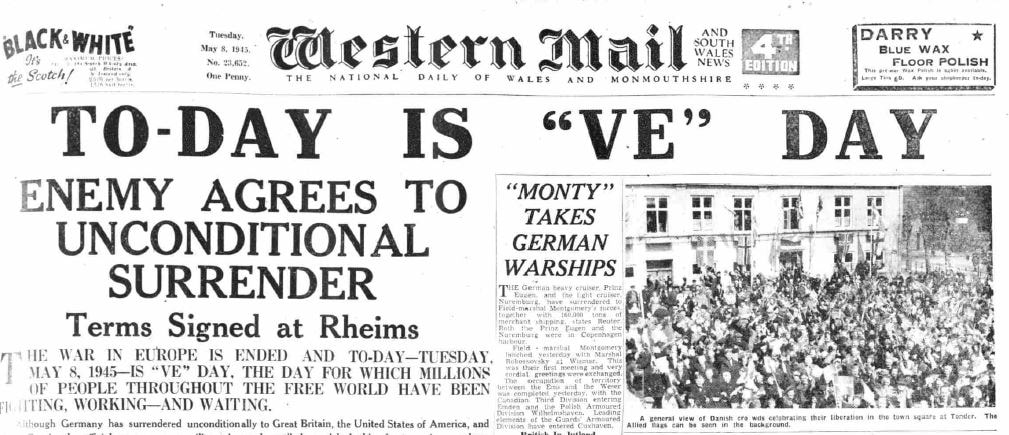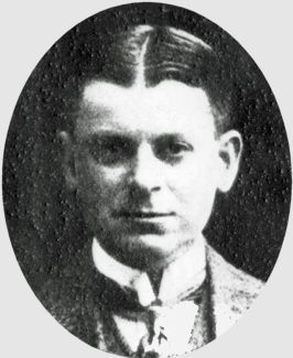Peace: End of the War Alan Payne February 2018
The war came to an end in stages and the weary residents of Box became increasingly desperate to begin a new life in peacetime Britain. When the success of the Dieppe D-Day landings of 6 June 1944 was assured, the civilian services stood down one-by-one: on 3 December 1944 the Home Guard; on 1 February 1945 some National Fire Service; and on 2 May Civil Defence. But the war dragged on with German V2 rocket launched against London and the Allied bombing of Dresden in February 1945.[1]
VE Day Celebrations
At last, on Tuesday 8 May 1945, VE Day (Victory in Europe) was declared and in Box at an announcement of peace made at Recreation Field (The Rec). The VE Day celebrations lasted two days.[2] They were organised at almost a moment’s notice ... when the news came through on a wireless set and led by J Browning (treasurer) and CH Fides (secretary) with special mention also to H Miller (transport), N Martin (lighting), Mrs Crowdy and G Abrahams (for gifts and prizes).
The parish magazine of June 1945 described the event: The Peace celebrations in the village will long be remembered by all who took part in them. The village celebrations were wonderful... VE Day and the following day were carried through in the best of spirits and everyone who could contributed to make it a success. The schoolchildren’s choir sang, the King’s speech was relayed on tannoy, and there was a fete, bonfire, fireworks display and dancing until after midnight on the cricket pitch to the accompaniment of wireless music.
It was estimated that seven hundred people crammed into Box Church at 11am on Sunday 13 May and Leslie Bence organised a loud speaker to relay the service to the congregation who were seated in the churchyard. More was planned, especially after
18 June 1945 when the demobilisation of the armed forces began.
Peace Fete, 6 August 1945
A carnival fete for the Peace Commemoration was organised on August Bank Holiday to be held on the old Fete Field. The village joined together and the Welcome Home Committee run by Mrs E Holmes joined with the Peace Committee and proceeds were allocated one-third to the Welcome Home Fund Committee and the rest to the Peace Commemoration Fund.[3]
The village made a determined effort to celebrate. Mr J Reed of Northey Arms organised the refreshment tent and Mr Chapman Webb sorted out the route of the carnival procession from Henley Lane to the Fete Field, via the War Memorial, High Street, Market Place and The Bassetts. There were many stalls including one by Mrs Daniels (a young lady of 84) and the Women's’ Institute who ran a lemonade stand. A Rabbit and Poultry Show was organised by Box Hill Rabbit Club, a beauty contest, and the Bath Imperial Spa Band playing from 1pm until midnight.
VE Day Celebrations
At last, on Tuesday 8 May 1945, VE Day (Victory in Europe) was declared and in Box at an announcement of peace made at Recreation Field (The Rec). The VE Day celebrations lasted two days.[2] They were organised at almost a moment’s notice ... when the news came through on a wireless set and led by J Browning (treasurer) and CH Fides (secretary) with special mention also to H Miller (transport), N Martin (lighting), Mrs Crowdy and G Abrahams (for gifts and prizes).
The parish magazine of June 1945 described the event: The Peace celebrations in the village will long be remembered by all who took part in them. The village celebrations were wonderful... VE Day and the following day were carried through in the best of spirits and everyone who could contributed to make it a success. The schoolchildren’s choir sang, the King’s speech was relayed on tannoy, and there was a fete, bonfire, fireworks display and dancing until after midnight on the cricket pitch to the accompaniment of wireless music.
It was estimated that seven hundred people crammed into Box Church at 11am on Sunday 13 May and Leslie Bence organised a loud speaker to relay the service to the congregation who were seated in the churchyard. More was planned, especially after
18 June 1945 when the demobilisation of the armed forces began.
Peace Fete, 6 August 1945
A carnival fete for the Peace Commemoration was organised on August Bank Holiday to be held on the old Fete Field. The village joined together and the Welcome Home Committee run by Mrs E Holmes joined with the Peace Committee and proceeds were allocated one-third to the Welcome Home Fund Committee and the rest to the Peace Commemoration Fund.[3]
The village made a determined effort to celebrate. Mr J Reed of Northey Arms organised the refreshment tent and Mr Chapman Webb sorted out the route of the carnival procession from Henley Lane to the Fete Field, via the War Memorial, High Street, Market Place and The Bassetts. There were many stalls including one by Mrs Daniels (a young lady of 84) and the Women's’ Institute who ran a lemonade stand. A Rabbit and Poultry Show was organised by Box Hill Rabbit Club, a beauty contest, and the Bath Imperial Spa Band playing from 1pm until midnight.
|
In June 1945 it was announced that Charles B Cochran, world famous stage producer, usually known as CB, was coming from London to Box Fete on the August Bank Holiday.[4] CB was chiefly renowned for his productions of Noel Coward plays in the 1920s and 1930s and it was a surprising achievement for the Box Peace Commemoration and Welcome Home Committee to get him to the village. It was his connection with Maisie Gay that attracted him to Box as he wanted see her before it was too late.
Five thousand people are reported to have attended the celebrations on Fete Field which included a baby show and special shows for rabbits, poultry, flowers and arts and crafts as well as a weight-lifting demonstration by an Olympic champion.[5] CB's role at the fete was to judge a beauty contest of 80 contestants who came from Box and the surrounding area, all hoping for the chance of being discovered for stardom. Cochran had his own views about beauty and, according to his auto-biography, he proposed to judge the girls by the maxim, I always look at a girl's ankles before I look at her face.[6] |
Days later on 15 August 1945 the war was officially over when VJ Day (Victory over Japan) was announced following the surrender of the Emperor after the nuclear bombing of Hiroshima and Nagasaki.

The 1945 Peace Commemoration Committee Standing: Charlie Brokenborough, Bert Swan, Bill Dermott, Mr Cousins, Don Bradfield, Mr Beazant, Mr Cox, Cecil Lambert, Mr May, Arthur Adams, Mr A Cogswell, Mrs Burmingham, Mrs Baxter, Mr Abrahams, Mrs Davies, Rev Maltin, Harry Miller, Reg Cogswell, Bill Chaffey, Les Butt, Les Bence, Wilf Clothier, Mr Hayward, Mr Chapman Webb. Seated: Mrs Crowdy, Jim Browning, Charles Oatley, Mr Fildes, Doris Little and Mrs Holmes (courtesy Margaret Wakefield)
Aftermath
But there was urgent work to do as well as celebrate. The most pressing was to get the servicemen back home, especially those who had been held as prisoners-of-war. Their welfare and future was paramount as was getting back to some sort of normality.
A troupe of entertainers from Bath called the Victory Belles came to Box in October 1945 to raise funds for the local Welcome Home Fund.[7] For some families missing presumed dead became the reality when after months of waiting for news of released prisoners-of-war, the missing serviceman never returned and became lost in action. For others, the seriously injured were not able to continue their fight for survival.
The country was bankrupt and the post-war years were characterised by high unemployment and business recession.
The accounts of Colmer's, the Bath department store, revealed how businesses were affected. Within two years they paid £47,000 tax to the government. In 1942 the Excess Profits Tax was raised to 100% from 60% in the previous year.[8] The premium for buildings insurance payable went up exponentially and this was disallowed for tax deduction.
In 1947, Lieutenant Philip Mountbatten (Prince Philip), who at the time was serving in HMS Royal Arthur, opened a Garden of Remembrance in Station Road, Corsham.[9] On 10 July 1949, a dedication service was held in Box to put inscriptions on the War Memorial to the men of the parish who gave their lives in our defence.
But there was urgent work to do as well as celebrate. The most pressing was to get the servicemen back home, especially those who had been held as prisoners-of-war. Their welfare and future was paramount as was getting back to some sort of normality.
A troupe of entertainers from Bath called the Victory Belles came to Box in October 1945 to raise funds for the local Welcome Home Fund.[7] For some families missing presumed dead became the reality when after months of waiting for news of released prisoners-of-war, the missing serviceman never returned and became lost in action. For others, the seriously injured were not able to continue their fight for survival.
The country was bankrupt and the post-war years were characterised by high unemployment and business recession.
The accounts of Colmer's, the Bath department store, revealed how businesses were affected. Within two years they paid £47,000 tax to the government. In 1942 the Excess Profits Tax was raised to 100% from 60% in the previous year.[8] The premium for buildings insurance payable went up exponentially and this was disallowed for tax deduction.
In 1947, Lieutenant Philip Mountbatten (Prince Philip), who at the time was serving in HMS Royal Arthur, opened a Garden of Remembrance in Station Road, Corsham.[9] On 10 July 1949, a dedication service was held in Box to put inscriptions on the War Memorial to the men of the parish who gave their lives in our defence.
References
[1] Richard Tombs, The English and their History, 2014, Allen Lane, p.747
[2] Parish Magazine, June 1945
[3] Parish Magazine, June & July 1945
[4] Bath Weekly Chronicle and Herald, 30 June 1945
[5] Bath Weekly Chronicle and Herald, 11 August 1945
[6] Bath Weekly Chronicle and Herald, 21 July 1945
[7] Bath Weekly Chronicle and Herald, 13 October 1945
[8] Bath Weekly Chronicle and Herald, 28 March 1942
[9] John Poulsom, The Ways of Corsham, p.57
[1] Richard Tombs, The English and their History, 2014, Allen Lane, p.747
[2] Parish Magazine, June 1945
[3] Parish Magazine, June & July 1945
[4] Bath Weekly Chronicle and Herald, 30 June 1945
[5] Bath Weekly Chronicle and Herald, 11 August 1945
[6] Bath Weekly Chronicle and Herald, 21 July 1945
[7] Bath Weekly Chronicle and Herald, 13 October 1945
[8] Bath Weekly Chronicle and Herald, 28 March 1942
[9] John Poulsom, The Ways of Corsham, p.57

